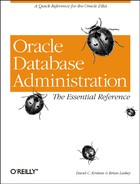Name
ALTER INDEX
Synopsis
ALTER INDEX [schema.]index_name[PCTFREEinteger] [INITRANSinteger] [MAXTRANSinteger] [PARALLEL ( {DEGREE {integer| DEFAULT} | INSTANCES {integer| DEFAULT} } ) ] [NOPARALLEL] [LOGGING | NOLOGGING ] [UNUSABLE] [STORAGE ( [NEXTinteger[K | M] ] [MAXEXTENTS {integer| UNLIMITED} ] [PCTINCREASEinteger] [FREELISTSinteger] [FREELIST GROUPSinteger] ) ] [ALLOCATE EXTENT (SIZEinteger[K | M] [DATAFILE 'filename'] [INSTANCEinteger])] [DEALLOCATE UNUSED [KEEPinteger[K | M]] [UNUSABLE] [DROP PARTITIONpartition_name] [SPLIT PARTITIONpartitionAT (valuelist) INTO (newpartition,newpartition)] [RENAME PARTITIONpartition_nameTOnewpartition] [RENAME TOnewindex_name]
Changes characteristics of an index (index_name).
Keywords
- PCTFREE
Specifies the amount of free space to leave in each data block for later updates and inserts.
- INITRANS
Changes the initial number of transaction entries allocated to each block of the index.
- MAXTRANS
Changes the maximum number of transaction entries allocated to each block of the index.
- PARALLEL
Specifies the level of parallelism to be supported, based on the following parameters:
- DEGREE
Specifies the degree of parallelism. An integer value specifies how many slave processes can be used. Specify DEFAULT to use the default value for the tablespace.
- INSTANCES
Specifies the number of instances that can be used to execute slave processes. Specify DEFAULT to use the default value specified for the tablespace.
- NOPARALLEL
Specifies that no parallelism is to be used.
- LOGGING
Specifies that the operation is to be logged to the redo logs.
- NOLOGGING
Specifies that nothing is to be written to the redo logs for this operation.
- UNUSABLE
Specifies that the index is to be marked unusable.
- STORAGE
Specifies the physical characteristics of the index as follows:
- NEXT
Specifies the size of the next extent in bytes, kilobytes, or megabytes. If the value is not a multiple of the database blocksize, it will be rounded up to a multiple of the database blocksize.
- MAXEXTENTS
Specifies the maximum number of extents that may be allocated for this index. The default will vary according to the database blocksize. Specify UNLIMITED for unlimited expansion.
- PCTINCREASE
Specifies the percentage by which each extent will grow over the previous extent. The default is 50, which means that each extent will be one-and-one-half times larger than the previous extent.
- FREELISTS
Specifies the number of free lists contained in each freelist group in this index. The default is 1 and the maximum depends on the database blocksize.
- FREELIST GROUPS
Specifies the number of groups of free lists for this index. The default is 1. This parameter should be used only with the Parallel Server option running in parallel mode.
- ALLOCATE EXTENT
Forces the immediate allocation of the next extent.
- SIZE
Specifies the size of the new extent in bytes, kilobytes, or megabytes.
- DATAFILE
Specifies the name of the operating system datafile, in the tablespace that holds this index, to hold the new extent. If the name is omitted, Oracle will select a datafile.
- INSTANCE
Makes the new extent available to the specified instance, which is identified by the initialization parameter INSTANCE_NUMBER. This parameter can only be used when running in parallel mode.
- DEALLOCATE UNUSED
Releases storage above the highwater mark.
- DROP PARTITION
Specifies that the specified partition is to be dropped.
- SPLIT PARTITION
Specifies that the partition is to be split into two new partitions. AT specifies the new, noninclusive upper bound for the first new split partition. INTO specifies the names of the two new partitions into which partition is to be split.
- RENAME PARTITION
Specifies that the partition is to be RENAMEd TO newpartition.
- RENAME TO
Specifies that the index index_name is to be RENAMEd TO newindex_name.
Notes
The index to be altered must be in your schema, or you must have the ALTER ANY INDEX privilege to issue this command.
If storage options are omitted, Oracle will allocate storage for the index as follows:
If the indexed table has no rows, the default storage values for the tablespace will be used.
If the indexed table has rows and the resulting index can be contained in no more than 25 data blocks, a single extent will be allocated for this index.
If the indexed table has rows and the resulting index is more than 25 data blocks, 5 equal-size extents will be allocated for this index.
